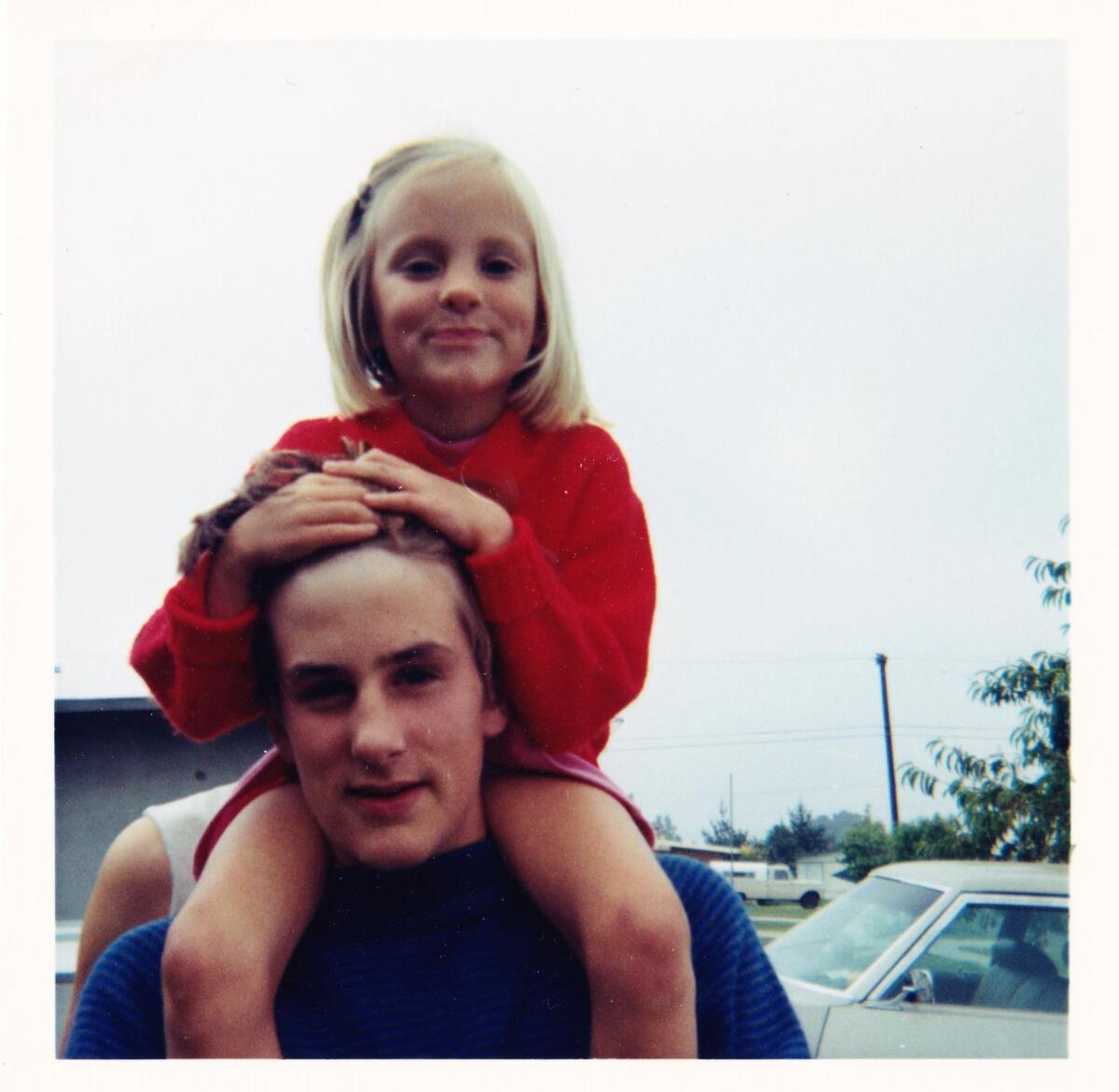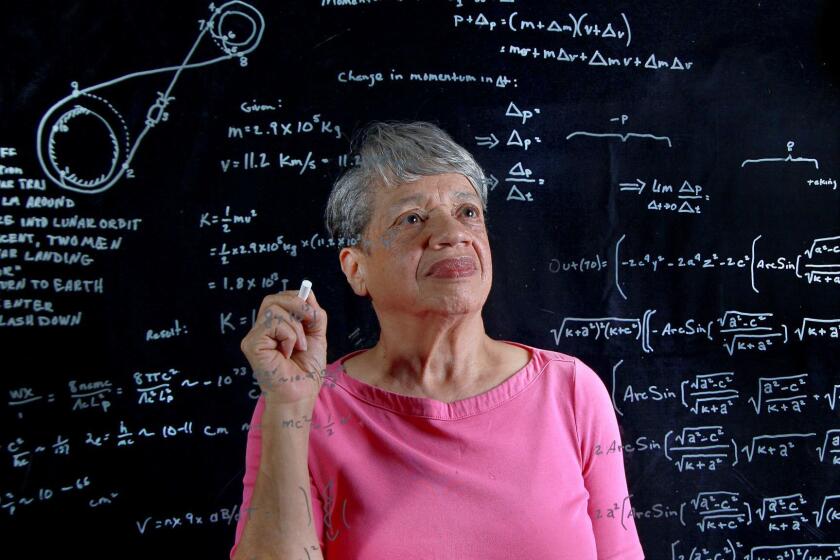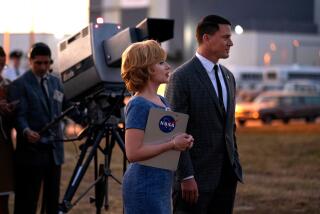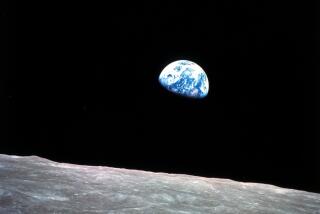Readers remember the Apollo 11 moon landing, 50 years later
On July 20, 1969, the United States put a person on the moon for the first time, inspiring wonder and amazement in many who witnessed the historic event. We asked our readers what memories stick with them as the moon landing approaches its 50-year anniversary. These are their stories.
Regardless of their age or where they were in the world that day, the moon landing left a lasting impression on many of those who followed along as Neil Armstrong took his first steps on the lunar surface.
We received dozens of reader responses, a selection of which are shown below. To everyone who responded, we thank you for sharing your story.
____________
Donald Wood, 7 years old — Boca Raton, Fla.
“I was 7 years old. I was fascinated by the Space Age. I watched many of the launches on TV - back then, black and white. I collected newspaper clippings and photographs. We lived in Florida, when Kennedy Space Center was the epicenter of the action. My father was in Europe on business on that day, so I was at home with my mother. I was in bed, but my mother woke me and told me to watch what was about to happen on TV. I can see the scene clearly now - the living room, the TV, the difficulty my very young brain had with hearing clearly the voice of Neil Armstrong through the static. My mother translated for me. I will always be indebted to Mom for waking me for that event. She could have easily let me sleep through it.”
Lisa Babilonia, 7 years old — Los Angeles
“At the time of the moon landing I was 7 years old and fascinated by astronomy. Born and raised in Los Angeles, my three favorite places were the Natural History Museum, the La Brea Tar Pits and the Griffith Park Observatory. I clearly recall watching the landing on our black and white TV. I held my breath in anticipation, and then exclaimed, ‘They did it!’ as Neil Armstrong stepped down from the ladder. I also went outside that night, looked up at the moon and waved to the astronauts.”
Tom Horton, 19 years old — Lackland Air Force Base, Texas
“I was in my fourth week of basic training at Lackland AFB. The drill sergeants let us stay up past taps that night. There were two flights, and about 120 guys crammed into a 20-square-foot room. This is El Paso, Texas in July — hot and humid. It seemed to all of us that Armstrong took forever to leave the Eagle. When he finally took that first step, the room erupted in cheers.”
As the 50th anniversary of the first moon landing approaches, the women who helped America’s early space efforts reflect on their often unheralded roles — and the indignities they endured.
Mark Swanson, 7 years old
“My father, Robert Swanson, was one of the hundreds of thousands of people who made Apollo possible as the production control manager for a company called Control Switch Corp, which created many of the electronic switches used in the command module and lunar module. I remember that he always had a big telephone book-sized book at home in the evenings when there was an Apollo flight. He told us there were only three of them and they had to be returned to Houston after the flight. About 10 years later, I was visiting the Air and Space Museum in Washington, D.C. with my parents and the Apollo 11 command module was on display. My father walked up to it and started pointing out all of ‘his’ switches through the command module window, explaining what they did, how they worked and how they were manufactured. After a couple of minutes, a group of about 50 had formed to listen and ask him questions. It was a proud moment for me.”
Wendy Quimby, 6 years old — California

“I was traveling with my two older brothers and my parents. We were on a cross-country camping trip and were in Monterey, California on July 20, 1969 watching the sea otters in the bay and exploring the area. I remember watching the actual landing on a storefront television in Monterey and then later that night our family watched the live TV coverage of the walk on the moon with my aunt, uncle, and cousins in Salinas, California.”
Susan Nares, 9 years old — Los Angeles
“We all gathered in front of my grandma’s wooden console colored television set and watched Apollo 11 get closer to the moon. It was quite a moment, as we were all astonished and amazed. I glanced at my grandmother as she watched intently with her teary eyes, as there was a moment of silence. It was as if a miracle had just happened. I thought of President John F. Kennedy and his words that the nation’s commitment should achieve the goal of landing a man on the moon before the next decade — and, it will not be one man going to the moon, it will be an entire nation. As a young girl, I knew something wonderful had just happened. We watched the footage as they placed the American flag on this fresh ground, and our flag waved proudly. Glad to have lived this moment in history.”
Brent Ramsey, 17 years old — Grand Prairie, Texas
“I was a teenage father living in Texas. I kept my almost 1-year-old son up and awake that night, while I held him on my lap to watch Armstrong’s first steps on a little black and white portable TV. It was just me and him alone that night in a dark house, but probably the most memorable father/son thing we ever did together — at least for me. I remind him of it all the time — that he actually saw the moon landing. He’s now 50.”
June A. Krehbiel, 19 years old — Woodbine, Kan.
“I was working at a 4-H camp in Kansas that summer. We staffers, a roomful, were glued to the one black and white TV, in awe of the science that had made the moon landing possible. We could not imagine that three guys from Earth were really on the moon and bouncing around and planting the flag. When we walked back to our cabin, that man in the moon was still there but something seemed so different.”
Brett L. Friedlander, 12 years old — Rockaway, N.J.
“I was in the Boy Scouts at the time and our troop was just finishing a weekend camping trip. Knowing that Apollo 11 would be landing on the moon that afternoon, our scoutmaster cut the trip short so we could get home in time to watch the historic walk on TV. I remember hearing the landing on the radio in the car on the way home, but the moonwalk didn’t happen until several hours later. My parents let my brother and I stay up to watch the whole thing. Funny, but of all the things I remember about that night, the one thing that stands out to me all these years later was Walter Cronkite’s reaction to the event. He took off his glasses, shook his head and just smiled a kind of ‘I can’t believe this is happening’ kind of smile. At that moment, we were all excited 12-year-old kids!”
The passage of half a century has blurred many of the reasons that the United States was able to accomplish what seemed like science fiction: the July 20, 1969, landing of Apollo 11 on the moon.
Bruce Northwood, 8 years old — Kaitaia, New Zealand
“I was eight years old and my family lived in a small town named Kaitaia (population about 3000) in the far north of New Zealand. My parents worked out the significance of what was happening with Apollo 11 and got me and my younger sister out of bed to listen to the live radio broadcast. Although much of what was happening was lost on young children, our parents thought it important that we listened to such an important historical event. I am pleased they did that. We sat on the floor around the cabinet with the radio and did our best to listen.”
Mark Toft, 6 years old — Cincinnati
“My oldest brother Billy was in Air Force ROTC partly because he wanted to be an astronaut. He had us keyed up to watch all the TV coverage beginning with Apollo 7. That summer of 1969 he took us to see our first non-Disney movie, ‘2001: A Space Odyssey’. Young as we were then, and even though it was summer time, my parents told us if we wanted to watch the moonwalk that late at night, we’d have to go to bed by 8 o’clock and then Billy would roust us when it was time. The next day, I was on the living room floor with an upside down empty pill bottle and some bobby pins stuck around the opening: my own homemade model Lunar Module.”
Elizabeth Fewtrell, 9 years old — Bakersfield, Calif.
“It was a very exciting day, not only because of the moon landing. My younger sister and I were thrilled by the unexpected birth of three baby guinea pigs. Of course, the little baby boy guinea pigs were appropriately named Armstrong, Aldrin, and Collins. And yes, I also remember watching the landing in complete awe.”
Dennis White, 18 years old — Sterling, Alaska
“The morning of the scheduled moonwalk, I was at the door of an elderly Alaskan homesteader. I was told his was the only home in this remote area with a television. I explained that the first man would be stepping on the moon that morning and asked if I could watch on his TV. He had an old black and white television and rabbit ears with foil for reception. He and others who lived in the area were little interested in the event as their attention was on the active salmon run and keeping watch for Grizzly bears. It was not lost on me that this gentleman was a teenager when the first airplane flew at Kitty Hawk in 1903. As the 18-year-old kid and the near 80-year-old Alaskan watched together, he said, ‘Is that man steppin’ on the moon? Well, ain’t that somethin?’”
Retired astronaut Wally Schirra spoke for the world with his commentary for CBS News during the Apollo 11 moon landing on July 20, 1969: “Thank you, television, for letting us watch this one.”
Kenneth D. Salter, 7 years old — Los Angeles
“To the people of 1969, the moon landing was visceral. It occurred in our own backyards, right in front of our eyes. I remember my 7-year-old self stepping onto the back porch and looking up into the summer night sky. I fixed my gaze upon the moon and thought, ‘There are people up there, right now — right where I am staring. Never before tonight has anyone been able to look up at the moon and think this thought.’”
Dick Ray — Republic of Vietnam
“I was an avid follower of the space program. Never missed a launch from Mercury through Gemini and into Apollo. Then on April 9, 1968, I was drafted. In July 1969, I was at Camp Pape, a temporary fire base near Chu Lai, Republic of Vietnam. I don’t believe anyone had an AM radio to pick up AFVN, so I had no idea that the moon mission was going on. I recall someone mentioning it a few weeks after the fact and being really upset that I had missed the whole thing. The same feeling I had at missing the Mets winning the World Series and the Jets winning the Super Bowl.”
Tracey Campbell, 18 years old
“I rarely watched TV with my parents, but that night I sat in the den with both my parents and held my breath, along with the world, as Apollo 11 began the descent to the moon’s surface. It was deathly quiet in our room. But when the capsule landed, we erupted in cheers - then immediately became quiet again. As Neil Armstrong stepped onto the moon’s surface, my Mom and I started to cry. I think I saw some tears in my Dad’s eyes, as well, and we all realized we were watching a true miracle and we were full of wonder, amazement and incredible American pride.”
More to Read
Sign up for Essential California
The most important California stories and recommendations in your inbox every morning.
You may occasionally receive promotional content from the Los Angeles Times.













